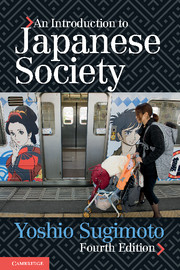Book contents
- Frontmatter
- Contents
- List of figures
- List of tables
- Preface to the fourth edition
- Map of Japan
- 1 The Japan Phenomenon and the Social Sciences
- 2 Class and Stratification: An Overview
- 3 Geographical and Generational Variations
- 4 Forms of Work in Cultural Capitalism
- 5 Diversity and Unity in Education
- 6 Gender Stratification and the Family System
- 7 ‘Japaneseness’, Ethnicity, and Minority Groups
- 8 Collusion and Competition in the Establishment
- 9 Popular Culture and Everyday Life
- 10 Civil Society and Friendly Authoritarianism
- References
- Index
- References
8 - Collusion and Competition in the Establishment
- Frontmatter
- Contents
- List of figures
- List of tables
- Preface to the fourth edition
- Map of Japan
- 1 The Japan Phenomenon and the Social Sciences
- 2 Class and Stratification: An Overview
- 3 Geographical and Generational Variations
- 4 Forms of Work in Cultural Capitalism
- 5 Diversity and Unity in Education
- 6 Gender Stratification and the Family System
- 7 ‘Japaneseness’, Ethnicity, and Minority Groups
- 8 Collusion and Competition in the Establishment
- 9 Popular Culture and Everyday Life
- 10 Civil Society and Friendly Authoritarianism
- References
- Index
- References
Summary
Japan’s establishment comprises three sectors – big business, parliament, and the national bureaucracy – which some commentators say are in a three-way deadlock. The economic sphere, overseen by the leaders of big corporations, is subordinate to the public bureaucracy, which controls the private sector through its power to license companies, regulate their activities, and decide upon the implementation of publicly funded projects. However, officials in the bureaucracy are subservient to legislators, especially those of the governing parties, who decide on the bills that bureaucrats prepare for the National Diet and whose ranks many officials join after they have climbed to a certain career level. Politicians, in turn, remain submissive to the leaders of the private sector, because they require pecuniary contributions to individual and party coffers to maintain their political machines. Figure 8.1 summarizes mutual dependence and competition among these three power blocs at the helm of Japanese society.
The three-way structure of Japan’s establishment resembles the tripartism of politics, business, and labor, which collectively coordinates the policy-making processes in some European and Australasian countries. However, the Japanese pattern is characterized by the conspicuous absence of labor union representatives. Although the largest national labor confederation, Rengō, has some influence on the state decision-making process, its level of representation is hardly comparable to that of union organizations in other countries. The public bureaucracy enjoys strong influence over both the economy and the politics of the entire nation.
- Type
- Chapter
- Information
- An Introduction to Japanese Society , pp. 225 - 256Publisher: Cambridge University PressPrint publication year: 2014



